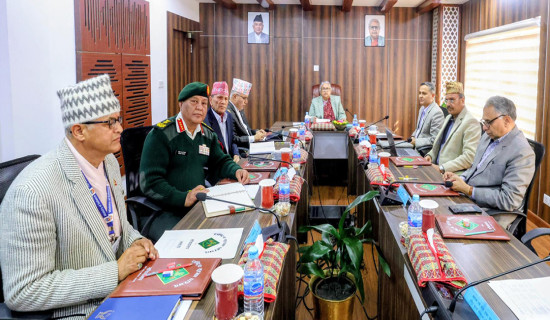- Thursday, 5 March 2026
Electronic Industrial Potential In Nepal
Nepal's burgeoning electronic industry presents a significant opportunity for fostering foreign direct investment (FDI) and driving economic growth. In an increasingly interconnected global economy, the electronic sector has become pivotal, attracting global investors. Nepal, with its strategic location and untapped potential, stands poised to become a magnet for FDI in this sector.
The appeal of Nepal's electronic industry lies in its growing market, skilled workforce, and supportive government policies. Rising disposable incomes and a growing appetite for electronic products fuel this market. Additionally, Nepal's technically skilled workforce makes it an attractive destination for investors. Government initiatives, including tax breaks and investment subsidies, create a conducive environment for FDI, facilitating technology transfer, knowledge exchange, and access to global markets. The collaboration between foreign investors and local businesses is symbiotic, combining financial capital, technological expertise, and international networks with local market insights and operational capabilities.
Challenges
Despite its potential, Nepal's electronic industry faces several challenges. Inadequate infrastructure, such as unreliable power supply, poor transportation networks, and limited telecommunications infrastructure, hampers production and distribution. Regulatory hurdles, bureaucratic inefficiencies, and limited access to finance also pose significant barriers. Complex regulatory processes, unclear policies, and inconsistent enforcement deter investment, while limited access to affordable financing restricts innovation, technology upgrades, and capacity expansion, impeding the industry's ability to compete globally.
Electronic empowerment
Streamlining regulatory processes, clarifying policies, and enhancing transparency are crucial. Simplified and consistent regulatory frameworks will provide investors with greater confidence and encourage investment in Nepal's electronic industry. This involves harmonising regulations, reducing bureaucratic red tape, and ensuring consistent enforcement.
Increased government support through tax breaks, investment subsidies, and grants for research and development can significantly boost the industry. Facilitating partnerships between local businesses and foreign investors will support technology transfer, skills development, and market access. The government should play a proactive role in fostering these collaborations to create a more conducive environment for FDI.
Establishing specialised financing mechanisms tailored to the needs of electronic businesses, including venture capital funds, technology-focused loans, and export financing facilities, is essential. Providing accessible financing options will encourage investment in technology upgrades, capacity expansion, and market development, driving innovation and competitiveness in the sector.
Investments in infrastructure, such as reliable power supplies, robust telecommunications networks, efficient transportation systems, and dedicated industrial zones, are vital. Improving infrastructure will enhance operational efficiency, reduce production costs, and attract further investment. This will not only benefit the electronic industry but also stimulate economic growth across the country.
Investment in education and skills development programmes, including vocational training, technical education, and higher education focused on electronics and technology, is critical. Equipping the workforce with the necessary skills and expertise will help Nepal better meet the demands of the evolving electronic industry and compete in the global market.
Creating an ecosystem that fosters innovation and entrepreneurship is essential for unlocking the full potential of Nepal’s electronic industry. Establishing incubation centres, technology parks, and innovation hubs can nurture start-ups and facilitate collaboration between industry, academia, and government. Promoting a culture of innovation will position Nepal as a hotspot for technological advancements and creative solutions in the electronic sector.
Nepal’s strategic location between India and China offers a unique advantage for accessing regional markets and global supply chains. By positioning itself as a hub for electronic manufacturing and innovation, Nepal can attract investments that leverage this geographical advantage. Focusing on regional integration and international trade partnerships can further enhance Nepal’s role in the global electronic industry.
Conclusion
Nepal's electronic industry holds immense promise as a catalyst for economic growth, technological advancement, and societal transformation. With its strategic location and tech-savvy workforce, Nepal can become a hub for electronic manufacturing, innovation, and export. However, realising this vision requires concerted efforts from both the public and private sectors.
Investment in infrastructure, education, and research and development is essential. Upgrading physical infrastructure, such as transportation networks and telecommunications systems, will enhance the operational efficiency of electronic businesses and attract investment. Furthermore, investing in education and skills development programmes is crucial for equipping Nepal's workforce with the necessary technical expertise to compete in the global market. By nurturing a culture of innovation and entrepreneurship, Nepal can unlock the creative potential of its citizens and foster a vibrant ecosystem of start-ups and technology-driven enterprises.
Addressing regulatory challenges and streamlining bureaucratic processes are also crucial for attracting foreign investment. Clear and transparent regulations, coupled with government incentives and support mechanisms, will instill confidence among investors and encourage them to commit capital to Nepal's electronic industry.
In conclusion, Nepal's electronic industry holds the key to unlocking the country's economic potential and driving sustainable development. By harnessing the transformative power of technology, Nepal can create new opportunities for growth, job creation, and prosperity for its people. With visionary leadership, strategic investments, and a commitment to innovation, Nepal can chart a course towards a brighter future powered by its electronic industry.
(The author is an MBA student at SAIM College, Kathmandu.)

















